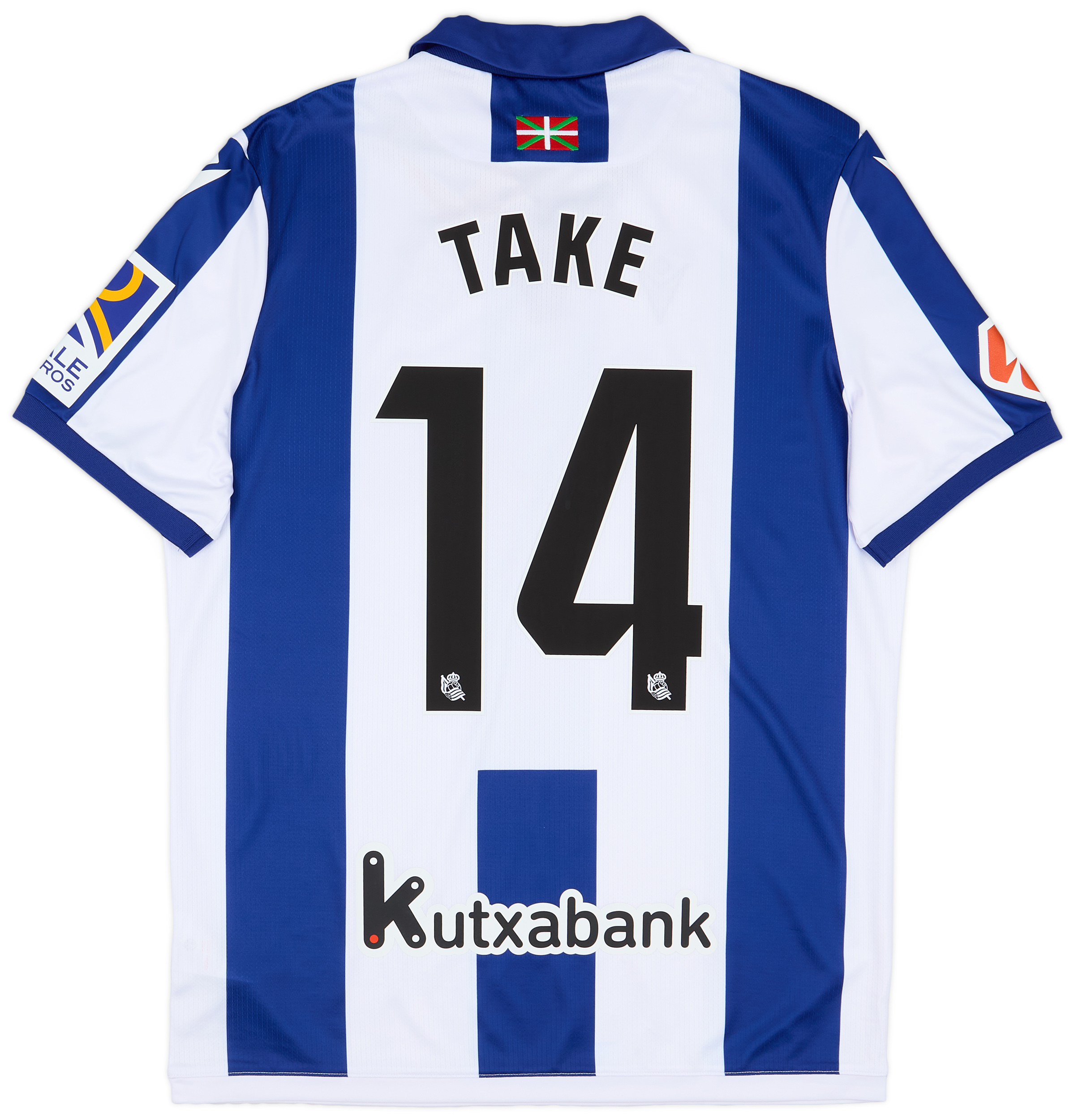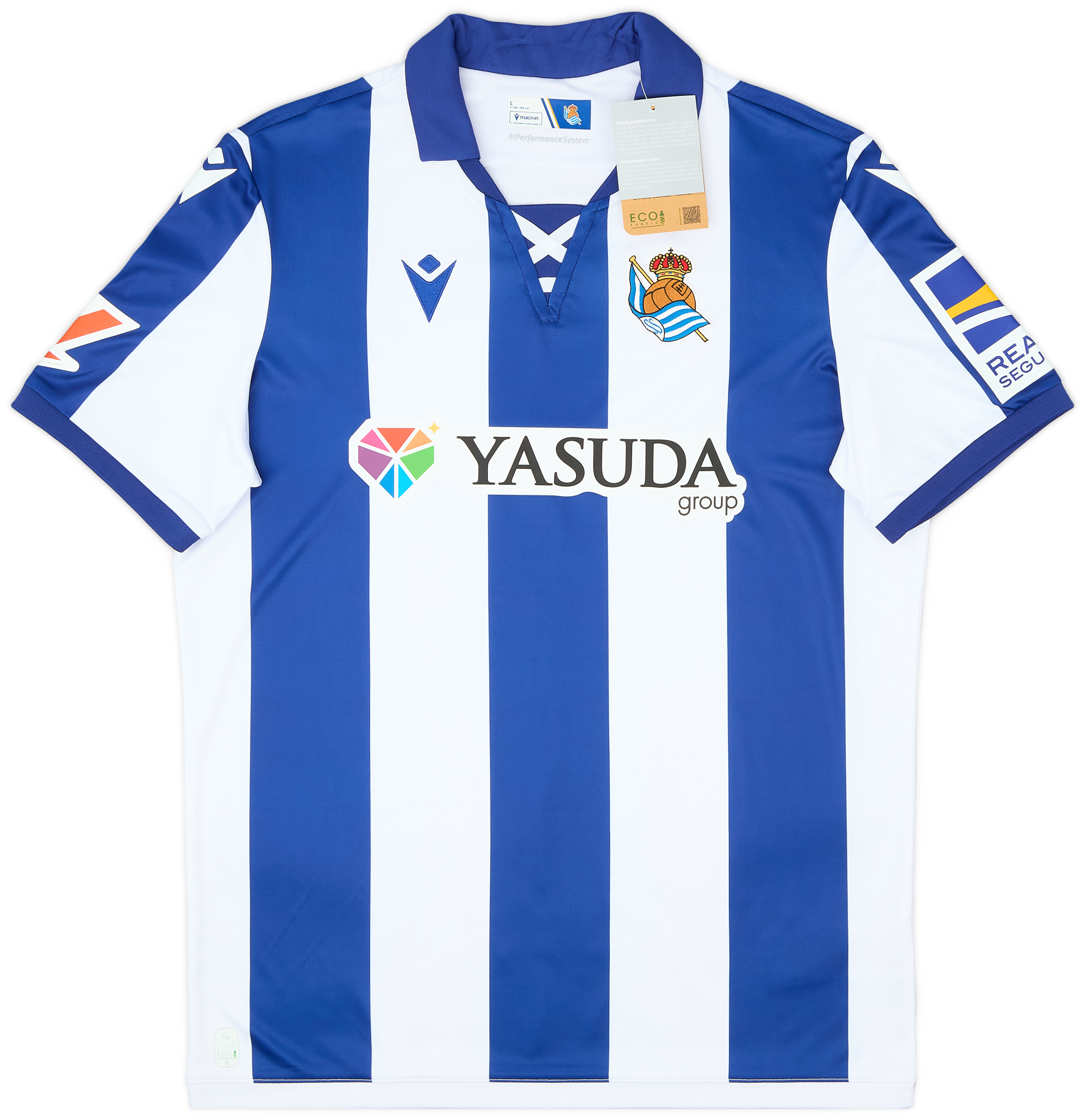Real Sociedad
Introduction Real Sociedad, officially known as Real Sociedad de Fútbol, is a revered football club based in San Sebastián, Spain. Established on September 7, 1909, the club has become synonymous with the rich football culture of the Basque Country. With its distinctive blue and white stripes, Real Sociedad is not just a symbol of sporting […]
2022-23 Real Sociedad Match Issue Europa League Away Shirt Illarra #4
148.99£ - ca: €176
2024-25 Real Sociedad Home Shirt Oyarzabal #10
122.99£ - ca: €145
2022-23 Real Sociedad Match Issue Europa League GK Shirt Zubiaurre #13
118.99£ - ca: €140
2022-23 Real Sociedad Match Issue Europa League Away Shirt Karrikaburu #33
118.99£ - ca: €140
2024-25 Real Sociedad Away Shirt Take #14
112.99£ - ca: €133
2024-25 Real Sociedad Home Shirt Take #14
112.99£ - ca: €133
2024-25 Real Sociedad Away Shirt Oyarzabal #10
112.99£ - ca: €133
2024-25 Real Sociedad Home Shirt
94.99£ - ca: €112
2021-22 Real Sociedad Home Shirt (L)
94.99£ - ca: €112
2024-25 Real Sociedad Away Shirt
94.99£ - ca: €112
1996-98 Real Sociedad Home Shirt - 7/10 - (Y)
82.99£ - ca: €98
2017-18 Real Sociedad Home Shirt (XL)
82.99£ - ca: €98
2017-18 Real Sociedad Home Shirt (XL)
82.99£ - ca: €98
2015-16 Real Sociedad Away Shirt - 8/10 - (L)
58.99£ - ca: €70
2023-24 Real Sociedad Third Shirt
58.99£ - ca: €70
2015-16 Real Sociedad Away Shirt - 9/10 - (S)
58.99£ - ca: €70
2023-24 Real Sociedad Home Shirt
58.99£ - ca: €70
2015-16 Real Sociedad Away Shirt - 8/10 - (XL)
58.99£ - ca: €70
2016-17 Real Sociedad Away Shirt - 8/10 - (L)
53.99£ - ca: €64
2023-24 Real Sociedad Away Shirt
44.99£ - ca: €53
Warning: A non-numeric value encountered in /var/www/netskribent.dk/retro-football-shirt.com/wp-content/themes/boot5/single-clubs.php on line 148
Introduction
Real Sociedad, officially known as Real Sociedad de Fútbol, is a revered football club based in San Sebastián, Spain. Established on September 7, 1909, the club has become synonymous with the rich football culture of the Basque Country. With its distinctive blue and white stripes, Real Sociedad is not just a symbol of sporting excellence; it represents the pride and passion of a vibrant community that deeply cherishes its heritage and traditions. Over the decades, Real Sociedad has carved out its own identity in Spanish football, consistently challenging the norms and striving for greatness.
Club History
The foundation of Real Sociedad can be traced back to the early 20th century when it was established by a group of students and sports enthusiasts inspired by the growing popularity of football in Europe. The club initially competed in local tournaments, but its ambitions grew, prompting it to join the professional ranks. In 1929, Real Sociedad became one of the founding members of La Liga, Spain’s top professional football division.
Throughout its history, Real Sociedad has faced both triumphs and challenges. The club initially struggled in the early years but gradually rose through the ranks. By the late 20th century, Real Sociedad enjoyed great success, cementing its place as a formidable force in Spanish and European football.
Achievements
Real Sociedad’s achievements are a testament to its rich history. The club has won numerous domestic trophies, most notably the La Liga title. In total, they have claimed the top-flight championship twice, in 1980-81 and 1981-82, both seasons marking the pinnacle of their domestic success. Furthermore, Real Sociedad has been crowned Copa del Rey champions multiple times, lifting the prestigious trophy in 1909, 1987, and most recently in 2020, showcasing its ability to perform in knockout competitions.
Internationally, Real Sociedad’s highlights include a memorable run in the UEFA Cup (now UEFA Europa League), where they reached the semifinals in 1983-84 and the group stage of the Champions League in 2003-04. The club has made a name for itself in Europe, demonstrating competitiveness against some of the continent’s top clubs.
Significant Players and Matches
Throughout its storied history, Real Sociedad has boasted a roster of exceptional talent who have left an indelible mark on the club. One notable player is Xabi Prieto, who spent his entire professional career at Real Sociedad, transitioning from a promising youth prospect to an inspirational captain. Prieto is celebrated not only for his leadership but also for his skillful play, making over 500 appearances for the club.
Another legendary figure is Antonio Jorde, known for his innings in the early 1980s, contributing significantly to the club’s consecutive La Liga titles. His defensive prowess and strategic play made him a cornerstone of the team during its golden era. Other notable players include the likes of Asier Illarramendi, who joined the club as a youth and garnered praise for his midfield performance.
Among the landmark matches in the club’s history, the thrilling El Clásico against FC Barcelona and Real Madrid always holds special significance. The 1981 La Liga title decider against Barcelona is etched in memory, where Real Sociedad secured a 2-1 victory, ensuring their first championship in 1981.
Cultural Impact
Real Sociedad’s presence extends far beyond the pitch, deeply woven into the cultural fabric of San Sebastián and the Basque region. The club enjoys a passionate fanbase known for its unwavering loyalty and dedication, often filling the Reale Arena to support the team. The fans, known as “txuri-urdines,” embody a sense of community spirit, with match days becoming a celebration of local culture.
The club’s influence transcends football, contributing to promoting Basque pride and identity. It has fostered initiatives aimed at encouraging participation in sports and community activities. Moreover, Real Sociedad’s commitment to youth development through its academy has produced a steady stream of talented players, ensuring the future sustainability of the club.
Conclusion
Real Sociedad is more than just a successful football club; it is a vital part of the Basque identity and Spanish football history. With a rich legacy built on hard work, resilience, and community support, the club has achieved remarkable success both domestically and internationally. As it continues to grow and evolve, Real Sociedad remains a beacon for aspiring footballers and a source of pride for its passionate supporters. Whether reliving its glorious past or looking ahead to the future, Real Sociedad embodies the spirit of football, making it a crucial player in the grand narrative of the sport.



















